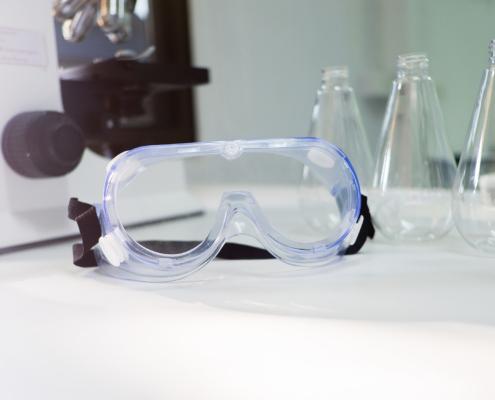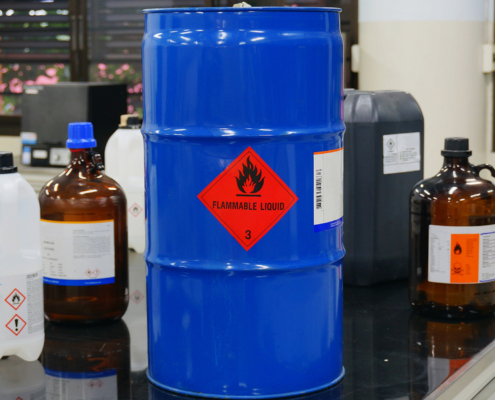
Nitrile vs Vinyl Gloves
Let’s settle the nitrile vs vinyl gloves debate once and for all.
An Introduction to Industrial Work Gloves
Disposable gloves are important for a variety of industries and applications. They’re designed to protect the person wearing the gloves–and, in some cases, the people around them. Shielding you from microbes, chemicals, and other potential threats, most gloves are capable of keeping your hands safe from a wide range of potentially destructive elements (similar to other forms of protective equipment, like goggles). To make them even more convenient, these gloves are also disposable—you can throw them away when you’re done and start fresh with a new pair when necessary.
That said, not all disposable gloves are the same. Some are designed for specific applications–and each type of glove has strengths and weaknesses you need to keep in mind.
Two of the most popular types of disposable gloves are nitrile gloves and vinyl gloves. But how exactly are these gloves made and what are these types of gloves used for? What’s the difference between nitrile vs vinyl gloves?
Nitrile Gloves
Nitrile gloves were introduced in the 1990s as an alternative to latex gloves, which were the dominant type of disposable glove at the time. Nitrile gloves aren’t quite as elastic or flexible compared , which you may have noticed if you’ve ever attempted to put on a pair. However, nitrile gloves provide superior protection, since they’re much more durable and capable of resisting chemical reactions.
Nitrile gloves are latex-free, effectively eliminating the risk of latex allergy reactions. They’re also puncture resistant, tough, and capable of providing protection in even some extreme environments. Accordingly, they are frequently used in medical-grade applications and industrial applications that require handling corrosive chemicals. One of the only downsides of nitrile gloves is that they tend to be more expensive to manufacture, making them less cost effective.
Some people also prefer nitrile gloves because they provide a high level of tactile sensitivity. In other words, while wearing these gloves, you’ll be better capable of sensing your environment and feeling what you touch. For this reason, nitrile gloves are especially important in applications that require precise dexterity.
Interested in PVC and nitrile gloves for chemical handling?
Vinyl Gloves
Now let’s take a look at vinyl gloves. Vinyl gloves are another alternative to latex gloves made from PVC, which is a petroleum-based material. Because vinyl gloves are ridiculously easy to make, they tend to be the least expensive gloves on the market. However, there are some significant tradeoffs that come with this lower price.
Notably, vinyl gloves are less durable than both latex and nitrile gloves, offering only the slightest level of protection against corrosive chemicals. Additionally, when you stretch vinyl gloves, the molecules that make up the fabric of the glove material separate, reducing the structural integrity of the gloves’ protective barrier. In other words, stretching vinyl gloves too far can reduce their capacity to protect you from external threats.
On top of that, vinyl gloves have a stronger negative environmental impact, making them a less sustainable choice.
What Are Nitrile Gloves Used For?
What are the best applications for nitrile gloves?
Workers use nitrile gloves in a variety of applications, though industrial applications and healthcare applications tend to be the most common. You’ll see these types of gloves in hospitals, dentistry facilities, beauty shops, laboratories, chemical plants, and manufacturing facilities. Because these gloves are so durable and capable of such strong protection, they’re practically the only truly protective glove option for people working in dangerous environments.
What Are Vinyl Gloves Used For?
What about vinyl gloves?
Because vinyl gloves don’t offer as much toughness or chemical resistance, you’re less likely to see them in industrial applications or healthcare environments. However, because vinyl gloves are cheap and highly flexible, they’re well-suited for light jobs and short-term tasks. You’ll often see these types of gloves used in restaurants, in low-risk healthcare applications, and in repetitive assembly line tasks. As long as the situation isn’t hazardous and there’s a relatively low risk of infection, vinyl gloves can work fine.
The Advantages of Nitrile Gloves
Let’s recap some of the best advantages of nitrile gloves:
Chemical resistance. In terms of chemical resistance, nitrile gloves are simply the best. If you’re going to work with corrosive or dangerous chemicals, you need nitrile gloves to ensure adequate protection.
High durability. Nitrile is also a tougher substance, providing more natural durability. These types of gloves are much less likely to rip, tear, or suffer from punctures. If you’re concerned about the structural integrity of your gloves, nitrile gloves are a must.
Tactile sensitivity support. If you’re a type of person who likes to feel what they’re working with, or if you’re working in a capacity that requires sensitive dexterity, you’ll enjoy the tactile sensitivity support that nitrile gloves offer.
Tight fits. Some people appreciate the tight fits that nitrile gloves support. Because they don’t stretch as easily as other disposable gloves, they stick to your hands better.
Lightweight material. Nitrile is a very lightweight synthetic material, making these gloves easy to transport, store, and use.
Long shelf life. Thanks in part to their high durability, nitrile gloves also benefit from a long shelf life. You can store them indefinitely and still use them to protect yourself.
The Advantages of Vinyl Gloves
Now let’s refresh our understanding of the advantages of vinyl gloves:
Cheapness. The most important benefit of purchasing vinyl gloves is their inexpensiveness. Nitrile gloves are superior in most functional ways, but they also tend to be more expensive.
Antistatic features. Vinyl gloves have antistatic properties that are useful in some applications.
High flexibility. Some people love how flexible vinyl gloves are, making them easier to wear and remove.
Resistance to water, oils, and fats. Despite not having much protection against corrosive chemicals, vinyl gloves do adequately protect you against water, oils, and fats.
Ready to start your custom order of nitrile gloves for chemical handling?





